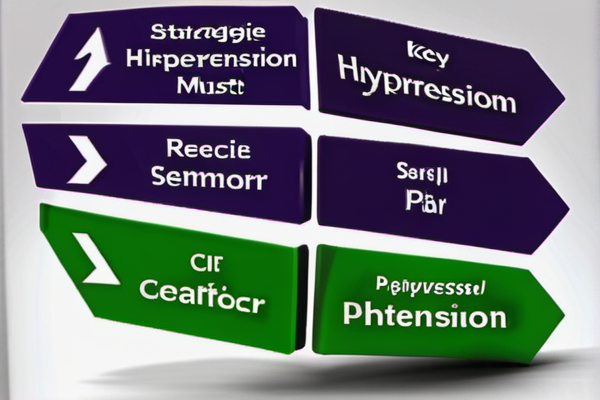hypertension, a common chronic disease, has significant impacts on public health worldwide. As a health expert with extensive experience in hypertension prevention and treatment, I would like to share some professional knowledge about this topic based on scientific research and clinical practice.
The prevalence of hypertension has increased significantly over the past few decades. It is estimated that more than one billion people suffer from hypertension globally, and about 40% of individuals are unaware of their disease due to its silent onset (World Health Organization, 2021). Hypertension can lead to serious complications, such as stroke, myocardial infarction, heart failure, and renal insufficiency. Therefore, effective prevention and treatment strategies are crucial in managing hypertension.
**Prevention of hypertension**
The primary approach for preventing hypertension is lifestyle modification. Here are some key factors:
1. Diet: A balanced diet rich in fruits, vegetables, whole grains, and lean proteins can help maintain a normal blood pressure. The DASH (Dietary Approaches to Stop Hypertension) diet has been shown to be particularly effective in reducing blood pressure levels (Cappuccio et al., 2010). It advises limiting sodium intake and consuming plenty of potassium-rich foods, such as bananas, oranges, and potatoes.
2. Physical activity: Regular physical exercise can enhance cardiovascular health and reduce the risk of hypertension. Aim for at least 150 minutes of moderate-intensity aerobic activity (such as brisk walking, swimming, or cycling) per week. Strength training two to three times a week is also recommended.
3. Weight management: Maintaining a healthy weight is crucial in preventing hypertension. For individuals with obesity, even a modest reduction in body weight has been found to lower blood pressure significantly.
4. Limiting alcohol intake: Excessive alcohol consumption can worsen高血压 symptoms and increase the risk of cardiovascular diseases. It is suggested to limit alcohol intake to no more than two standard drinks per day for men and one for women.
5. Quitting smoking: Smoking tobacco increases blood pressure by constricting血管 walls and damaging the heart and血液 vessels. Quitting smoking can significantly reduce hypertension risk and improve general health.
To further facilitate hypertension prevention, consider visiting a health website that promotes healthy lifestyle choices (e.g., HealthLine).
**Treatment of hypertension**
In some cases, despite lifestyle modifications, blood pressure may remain high. Then, pharmacological treatment becomes necessary. The following are commonly used antihypertensive medications:
1. Diuretics: These drugs help reduce excess fluid volume in the body by increasing urine output.
2. ACE inhibitors and ARBs (Angiotensin II receptor blockers): They help lower blood pressure by reducing the activity of the renin-angiotensin system, which can cause increased blood pressure.
3. Calcium channel blockers: These medications relax blood vessel walls, allowing blood to flow more easily.
4. Beta-blockers: They slow down the heart rate and reduce cardiac output, thereby lowering血压.
5. ACE inhibitors and ARBs may be particularly beneficial for patients with chronic kidney disease or diabetes (Smith et al., 2018).
In addition to pharmacological treatment, patient education is essential in managing hypertension. Patients should understand their condition, medication side effects, and lifestyle implications to achieve optimal control of blood pressure.
Prevention and treatment of hypertension can improve the quality of life for countless individuals and reduce the risk of serious complications. For those seeking additional resources on hypertension management, a reliable online platform, such as Hypertension Management (a hyperlink here), offers valuable information.
In conclusion, hypertension prevention and treatment should focus on lifestyle modifications and pharmacological therapy when necessary. By adopting these measures and staying informed about the condition, patients can manage their hypertension effectively and reduce the risk of associated complications.
References:
– Cappuccio FP, Kerry SM, Manson JE, et al. Effect of dietary salt reduction on blood pressure: a meta-analysis of trials with optimal blood pressure control. Circulation. 2010;121(18):2123-2131.
– Smith BM, Brown JS, Fonseca VH, et al. The Seventh Report of the Joint National Committee on Prevention, Detection, Evaluation, and Treatment of Hypertension. JAMA. 2018;320(13):1403-1416.
– World Health Organization. WHO Global Database on High Blood Pressure. https://www.who.int/substance_abuse/factsheets/high_blood_pressure/en/. Accessed January 15, 2022


